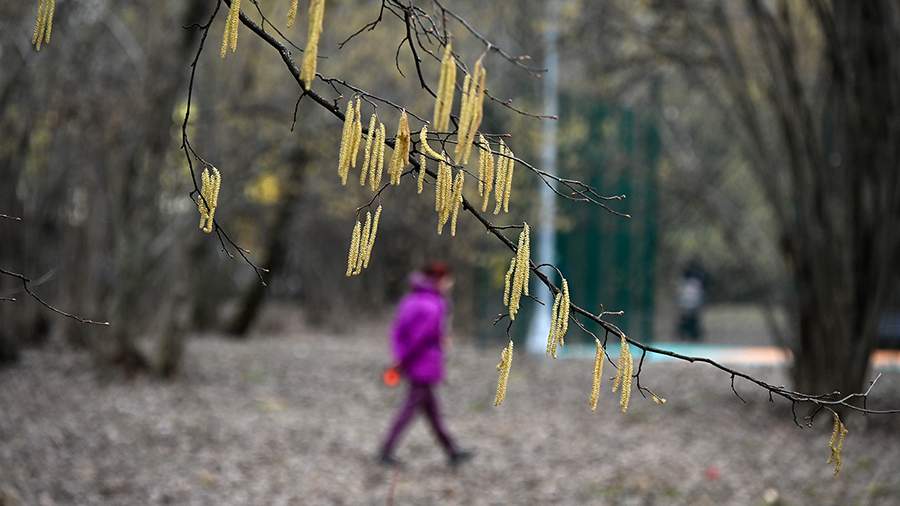Doctors told about the danger of spring pollinosis

In most regions of Russia, the pollen allergy season usually begins in April and May. But this year it started much earlier. Due to the small amount of snow and the abnormally warm winter, plant pollen has been detected in the air since the end of February. The main culprits of pollinosis are birch, alder and hazel. Experts from the company "Hemotest" and SBERBANK told Izvestia on March 21 what is the danger of spring allergies and how to cope with an exacerbation.
Gulnara Memetova, an allergist and expert at the Hemotest laboratory, noted that allergies can occur at any age.
"Often people who have never experienced hay fever attribute a sudden cough and runny nose to acute respiratory viral infections and do not treat allergies in any way. Meanwhile, it not only reduces the quality of life, but can also lead to serious complications such as anaphylaxis and bronchial asthma," she said.
The doctor stressed that if pollinosis is suspected, it is worth visiting an allergist and undergoing examinations to find out which allergens cause it. After that, the doctor will recommend a hypoallergenic diet, antihistamines, and immunotherapy.
It will not be possible to completely stop the attacks of this disease, but it is possible to alleviate the course of seasonal allergies. During periods of active dusting, experts advise not to go outside if possible, it is recommended to carry out wet cleaning more often at home, and use an air purifier. After returning from the street, you should take a shower and rinse your nose with saline solution.
Experts have drawn attention to the fact that certain vitamins and minerals can also alleviate the course of hay fever. For example, vitamin C (ascorbic acid) normalizes the immune system and reduces the production of histamine, a substance responsible for an allergic reaction. In addition, vitamins D, B5, B12, PP (nicotinic acid) help to fight allergies. Vitamins and their dosage are selected individually and not during an allergic exacerbation. Preventive courses of zinc and selenium also help to mitigate allergic reactions.
Dmitry Gurov, pharmacist and head of the SBER EAPTEK pharmacy, added that weakened immune systems can contribute to the development and intensification of allergy symptoms.
"The mechanism here is complex, and the immune system, which is not functioning efficiently enough, may react "incorrectly" to normally harmless allergens such as pollen, dust, and others, causing an overreaction, which in turn may manifest itself as allergic symptoms. Weak immunity is not the cause of allergies, but it can become a factor that exacerbates its manifestations," he said.
According to him, taking vitamins is an important link in the overall package of actions aimed at strengthening the immune system along with proper nutrition and a healthy lifestyle. The expert advised paying attention to vitamin D, which plays an important role in immune function, and its deficiency can weaken the immune system, vitamin C, an antioxidant that supports the immune system, B vitamins, which are necessary for the normal functioning of cells of the immune system, and zinc, necessary for the normal functioning of immune cells.
In turn, Memetova clarified that vitamins and minerals should not be taken uncontrollably, without taking into account their combination and dosage.
"In combination with certain medications, as well as in high doses, they, on the contrary, can worsen a person's condition. Therefore, if an allergy is suspected, a consultation with a doctor is necessary, who will prescribe a treatment regimen taking into account all the features of the course of the disease," she explained.
Gurov warned of the need to be careful when taking supplements with bioflavonides, beneficial antioxidant substances of plant origin, also known as "vitamin P", during the period of exacerbation of allergy symptoms.
"Some bioflavonoids may have antihistamine properties, but in other cases they may increase allergic reactions. The interaction is very individual and depends on the specific bioflavonoid. You should also be careful about taking certain herbal medicinal infusions and decoctions — they can enhance or weaken the effect of antihistamines," the expert concluded.
Earlier, on March 4, Natalia Ilyina, First Vice President and General Director of the Russian Association of Allergologists and Clinical Immunologists (RAAKI), told the Izvestia News Center that a quarter of the Russian population has an allergic disease. At the same time, a significant number of Russians have not been diagnosed with allergies.
Переведено сервисом «Яндекс Переводчик»

